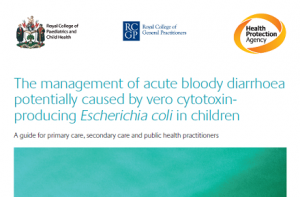
The new guidelines will emphasise the need for
primary care clinicians to seek urgent specialist advice whenever a child is reported to have had a single acute episode of bloody diarrhoea, provide secondary care clinicians with guidance on the assessment and management of such referrals and ensure that all clinical staff are aware of the need for urgent public health action where E. coli infection is suspected.
The recent outbreak of E. coli O104 in Germany demonstrates the need for rapid management and treatment of E. coli cases and the serious health complications that can result from this infection, such as Haemolytic Uraemic Syndrome (HUS) which affects the blood, kidneys and in severe cases, the central nervous system.
Although HUS is quite a rare complication from E. coli infection, it is the most common cause of acute kidney failure in children. In the UK, around ten per cent of E. coli cases each year lead to HUS.
In the UK the most common form of E. coli is the O157 strain, with the majority of outbreaks linked to open farm visits where children may have been in contact with animals such as sheep, goats, cattle or their environments. Although the risk of infection is low when set within the context of the millions of farm visits that take place each year, there are on average around three outbreaks of gastrointestinal disease linked to visits to petting farms each year in the UK.
Dr Nick Gent, a health protection consultant at the HPA who has led the production of the new E. coli guidelines, said: “Although cases of acute bloody diarrhoea in children linked to E. coli O157 are comparatively rare, the HPA receives reports of between 300 to 500 cases a year in those aged 10 or younger, with cases increasing in late spring, summer and autumn. As some cases can lead to kidney failure and fatalities, urgent reporting and referral is necessary to ensure children receive specialist paediatric assessment and have the best chance of recovery.”
Young children are most at risk from E. coli O157 and are particularly vulnerable to these infections. Children under the age of five are also the most likely to contract these infections as their personal hygiene is not as well developed.
Dr Gent added: “When visiting open farms it is important to remember that contact with farm animals carries a risk of infection because of the germs they carry. Hand washing is the most important way to reduce transmission of illness after handling animals, so it’s essential that hand washing in young children is supervised after petting animals on farm visits, and remember that sanitising hand gels are not a substitute for washing hands as they don’t remove dirt in the same way that running water and soap can.
“In the event of contracting an infection, as with any case of diarrhoea, it is important people remember to drink plenty of water to keep hydrated and anyone with bloody diarrhoea, particularly children, should seek medical attention immediately.”
These guidelines reinforce the NICE guidance on the management of diarrhoea and vomiting in children under five years and have been endorsed by Royal College of Paediatrics and Child Health and the Royal College of General Practitioners.
Dr Jan Dudley, chair of the Clinical Standards Committee at the Royal College of Paediatrics and Child Health, said: “We welcome the development of this guidance on early intervention and management of bloody diarrhoea caused by E. coli O157. This will be an important aid to help healthcare professionals to mitigate against the progression of the uncommon but potentially devastating condition that is HUS.”
Dr Maureen Baker, Health Protection Lead, at the Royal College GPs said: “This guidance is extremely useful in that it will support GPs and practice teams in correct management of this condition and help provide important reassurance to parents and their children.”
‘The management of acute bloody diarrhoea potentially caused by vero cytotoxin producing Escherichia coli in children’ PDF is available here.




